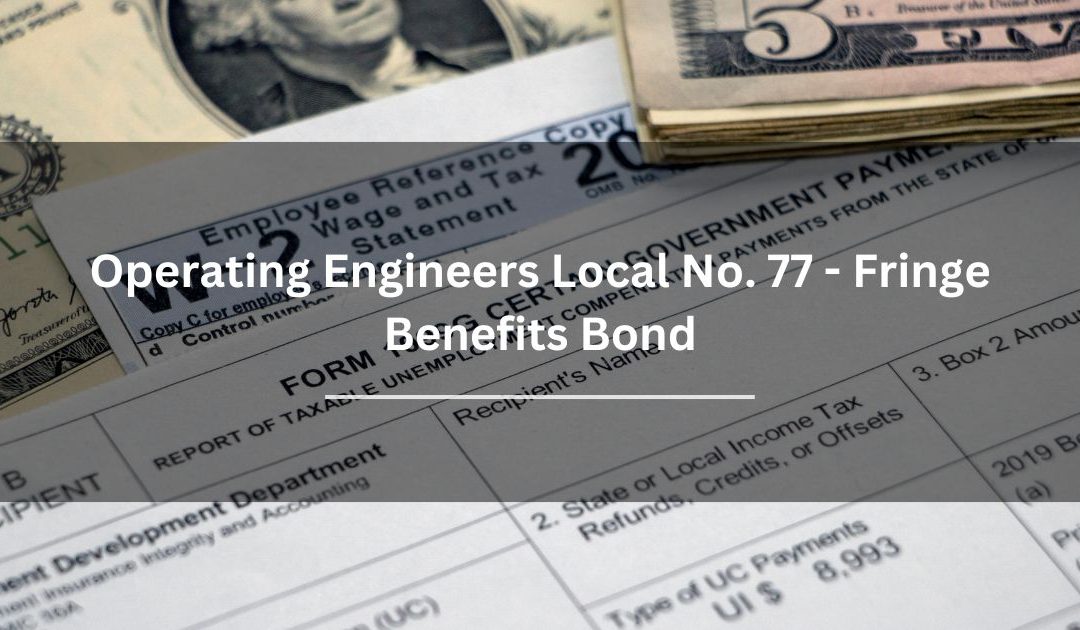Get an Instant Quote on Fringe Benefits Bond
Introduction
From our perspective, contractors in Maryland working with Operating Engineers Local No. 77 are committed to maintaining fair wages and benefits for their workforce. To guarantee compliance with these commitments, contractors must obtain an Operating Engineers Local No. 77 - Fringe Benefits Bond. This bond ensures that employees receive the wages and benefits owed to them by their employers, protecting workers while promoting compliance with collective bargaining agreements.
Similar to the Potomac Edison Company - Utility Deposit Bond, which guarantees that utility suppliers fulfill their financial obligations, the Local No. 77 bond safeguards workers’ financial interests. Contractors in Maryland who neglect to secure this bond face serious financial and legal repercussions, placing their reputation and business at risk.

Misconceptions About Fringe Benefits Bonds
We’ve noticed that many contractors misunderstand the purpose and scope of the Operating Engineers Local No. 77 - Fringe Benefits Bond. Some assume that this bond covers all fringe benefits regardless of compliance with labor agreements, while others mistakenly believe that having the bond means they are exempt from making regular benefit payments. In reality, this bond is not an alternative to fulfilling benefit obligations but rather a financial guarantee that ensures employees receive what is owed if the employer defaults.
These misconceptions mirror similar misunderstandings regarding the Potomac Edison Company - Utility Deposit Bond and the Maryland - Highway Performance Permit Bond, where applicants often misinterpret the coverage, duration, and legal requirements.
Swiftbonds: Guiding Contractors Through Compliance
Based on our experience, Swiftbonds has helped numerous contractors secure an Operating Engineers Local No. 77 - Fringe Benefits Bond by offering personalized guidance and ensuring compliance with Maryland’s labor and construction laws. Swiftbonds works closely with contractors to guarantee that they meet all regulatory and financial requirements, minimizing the risk of claims and maintaining positive relationships with labor unions.
Swiftbonds also assists contractors in obtaining other necessary bonds, such as the Potomac Edison Company - Utility Deposit Bond and the Maryland - Highway Performance Permit Bond, ensuring compliance across multiple sectors and protecting contractors from unforeseen liabilities.

Steps to Secure an Operating Engineers Local No. 77 Bond
What we’ve discovered is that securing an Operating Engineers Local No. 77 - Fringe Benefits Bond involves a series of well-defined steps to ensure compliance and protect the interests of workers. The process includes:
-
Assess Bond Requirements – Identify the bond amount required under the collective bargaining agreement with Operating Engineers Local No. 77.
-
Submit an Application – Provide business details, financial history, and documentation demonstrating compliance with labor agreements.
-
Receive a Bond Quote – Swiftbonds reviews the application and offers a competitive bond quote.
-
Pay the Bond Premium – Upon acceptance of the quote, the contractor pays the bond premium to activate coverage.
-
File the Bond with Local No. 77 – Submit the bond to the appropriate union or governing body for verification.
-
Maintain and Renew the Bond – Monitor expiration dates and renew the bond as needed to maintain uninterrupted compliance.
Swiftbonds simplifies this process, helping contractors avoid delays and ensuring continued compliance with labor agreements.
Consequences of Operating Without a Valid Bond
In our observation, contractors who fail to maintain a valid Operating Engineers Local No. 77 - Fringe Benefits Bond expose themselves to significant legal and financial risks. Without this bond, contractors may face penalties, contract termination, and potential lawsuits from unions or employees. Defaulting on fringe benefit payments can damage relationships with workers, resulting in lost trust and reputational harm.
These risks are comparable to the consequences faced by contractors who fail to maintain a Potomac Edison Company - Utility Deposit Bond or a Maryland - Highway Performance Permit Bond, where non-compliance can lead to financial penalties and revoked operational privileges.

Advantages of Securing a Fringe Benefits Bond
We’ve learned that securing an Operating Engineers Local No. 77 - Fringe Benefits Bond offers numerous benefits, protecting both the contractor and the workers:
-
Protects Workers’ Rights – The bond ensures that workers receive their wages and fringe benefits in accordance with collective bargaining agreements.
-
Enhances Contractor Credibility – Demonstrating compliance with union standards builds trust with labor organizations and project owners.
-
Prevents Legal Disputes – Maintaining a valid bond minimizes the risk of claims and legal conflicts.
These advantages mirror the protections provided by the Potomac Edison Company - Utility Deposit Bond and the Maryland - Highway Performance Permit Bond, which safeguard financial interests and ensure contractual obligations are met.
Maryland Compliance Requirements for Fringe Benefits Bonds
Maryland imposes strict labor compliance standards on contractors operating under collective bargaining agreements, including those with Operating Engineers Local No. 77. The Operating Engineers Local No. 77 - Fringe Benefits Bond guarantees that contractors comply with these standards, protecting workers’ wages and benefits while maintaining trust with union partners.
Similar compliance standards apply to the Potomac Edison Company - Utility Deposit Bond, which ensures suppliers fulfill their payment obligations, and the Maryland - Highway Performance Permit Bond, which guarantees that contractors meet performance requirements on public infrastructure projects.

Conclusion
We’ve come to appreciate that securing an Operating Engineers Local No. 77 - Fringe Benefits Bond is vital for protecting workers’ rights, ensuring compliance with labor agreements, and maintaining a positive reputation in Maryland’s construction industry. This bond provides financial protection, demonstrates a contractor’s commitment to honoring union agreements, and mitigates the risk of disputes and claims.
Swiftbonds simplifies the process of obtaining this bond, ensuring that contractors meet all regulatory requirements and maintain compliance with collective bargaining agreements. Whether securing an Operating Engineers Local No. 77 - Fringe Benefits Bond, a Potomac Edison Company - Utility Deposit Bond, or a Maryland - Highway Performance Permit Bond, Swiftbonds provides reliable assistance to protect contractors, workers, and public interests.
Frequently Asked Questions
Who is required to obtain this bond?
Contractors working under a collective bargaining agreement with Operating Engineers Local No. 77 must obtain this bond. It ensures that workers receive wages and benefits as outlined in the agreement.
What does the Operating Engineers Local No. 77 Bond cover?
This bond covers the financial obligation of the contractor to pay fringe benefits and wages under the terms of the collective bargaining agreement. It protects workers if the contractor defaults on these obligations.
How long does the Operating Engineers Local No. 77 Bond remain active?
The bond remains active for the duration specified in the collective bargaining agreement. Contractors must renew the bond to maintain uninterrupted compliance.
What happens if a claim is filed against the Operating Engineers Local No. 77 Bond?
If a claim is filed, the surety investigates the claim to determine its validity. If the claim is justified, the surety compensates the affected workers, and the contractor is responsible for reimbursing the surety.
How does the Operating Engineers Local No. 77 Bond differ from the Potomac Edison Utility Deposit Bond?
The Operating Engineers Local No. 77 - Fringe Benefits Bond guarantees that workers receive wages and benefits, while the Potomac Edison Company - Utility Deposit Bond protects the utility provider from financial losses. Both bonds safeguard financial interests but serve different industries and regulatory purposes.


